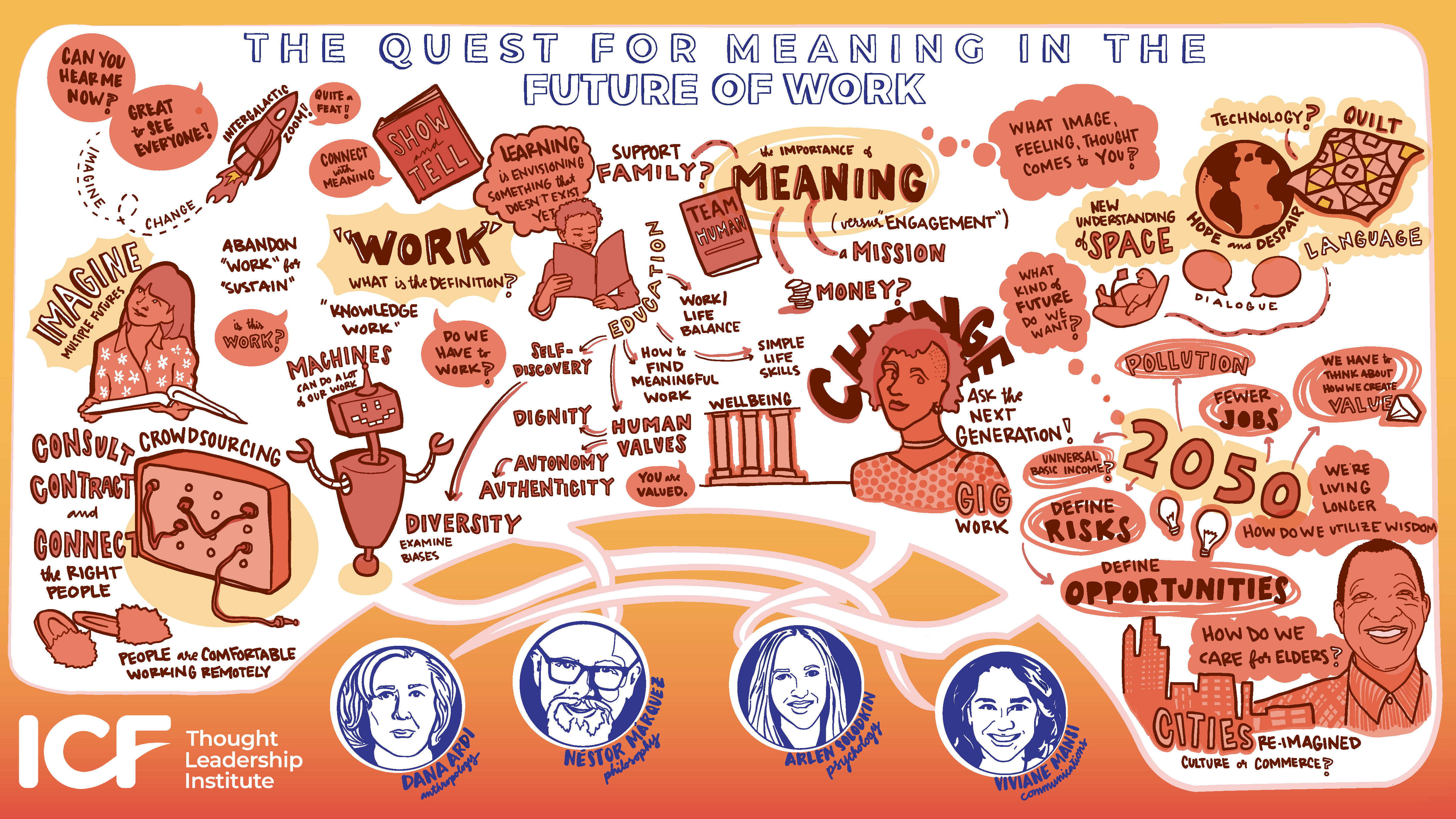Coaches can help business leaders navigate the transition to a more human work culture
Coaches are helping new and established leaders create a more human workplace to support a culture of well-being, purpose, and collaboration.
Challenge:
Leaders are balancing new roles as they work to support employee well-being and human-centered culture
Opportunity:
Coaches can help clients navigate changing leadership roles to support resilient and authentic leadership
Impact:
Leaders who can overcome fears and engage with employees on a human level model human-centered culture
Wisdom Weavers
Human-centered work calls for new types of leadership
“We have a growing need for the integration of humanity and our leadership because the other version is not sustainable anymore.”

Despite attempts to expand employee well-being programs, stress and burnout continue to be leading causes of workplace turnover. According to Gallup, 44% of global employees are experiencing daily stress, with higher rates of stress in South Asia. Similarly, a Deloitte survey measuring burnout among US workers found that 77% of respondents reported experiencing burnout in their current job, and 42% had left a job due to burnout. In the survey, the causes of burnout were overwork, unrealistic deadlines, and a lack of appreciation and recognition from leadership. These reports indicate a conflict between the intention to support well-being and cultures of overwork. To address stress and burnout in the workplace, leaders will need to shift to a human-centered work model that integrates well-being into corporate culture.
While work can be a source of stress and burnout for many, Wisdom Weaver Raj Sisodia believes healing organizations create caring cultures that support employee well-being and make a positive global impact. In his work teaching business students about conscious enterprise to speaking at the Global Happiness Summit, Raj champions the power of leaders to set the tone for a healing organizational culture. He explains, “The most important thing a leader can do is work on themselves and look within, because sometimes leaders are inflicting suffering on other people without even intending to do so.”
To find new ways to lead and engage teams through human-centered work, Raj encourages leaders to reflect and “work on themselves.” His latest work examines the value of self-reflection to support a life lived by purpose, inner peace, and healing. He explains, “Every leader should have a coach, and they should have a spiritual life that they are engaged in. It doesn’t have to be religious, but a spiritual inquiry based on understanding your own purpose: what drives you, and why you do what you do.” This process of reflection can also help leaders develop greater emotional intelligence and identify barriers inhibiting personal performance, including fear and trauma. Through healing and greater self-awareness, leaders gain curiosity and compassion to view challenges as opportunities for growth and learning.
Coaches can help clients to shift to a human-centered work model by:
- Supporting leaders to clarify their own purpose in order to better understand the importance of purpose for their team members
- Facilitating conversations with leaders and their teams to identify the contributing factors to burn out and envision alternative approaches to work
Coaching helps leaders explore fears and build greater resilience
The post-pandemic workforce is navigating a transition in culture and boundaries as people look to integrate work and life. Part of this integration includes a growing focus on healed leadership. Wisdom Weaver Neha Sangwan, a medical doctor and coach, describes how during the pandemic, she helped leaders address burnout, identify challenging emotions, and create unity in their teams by focusing on what matters most. However, even when leaders are connected to what matters, “the people who are really passionate sometimes do it from a wounded place.” Her book Powered by Me explores how leaders can address burnout and fear to heal themselves and lead authentically.
“As a leader, if I understand my wounds and traumas, work towards healing them, find my own purpose and voice — and that’s all part of healing — I can then serve the collective, the organization, and then ultimately positively impact the world.”

Sharing her experience helping executives grow from disruption, Wisdom Weaver Afsheen Ismail-Wey explains, “During Covid, the sanitized version of leadership was challenged. Suddenly, people were in our living rooms. We were unable to maintain those very strict boundaries between our humanity and our leadership.” Afsheen’s practice helps cultivate human and resilient leadership to support inclusive and productive work cultures. Instead of working to reestablish strict boundaries between “humanity and leadership,” Afsheen’s clients used the pandemic as an opportunity to work on their personal well-being and organizational culture.
One of the greatest challenges Afsheen helped her clients face was the idea that being a good leader meant being perfect. Perfectionist leaders, she explains, can cast that same expectation of perfectionism onto their teams, creating undue stress. Afsheen highlights, “Leadership is very difficult, and often, they spend a lot of time feeling alone, like imposters, judging themselves, carrying baggage from many different contexts.” To support her clients “to be more inclusive of others, we first need to help them be more inclusive of themselves.”
In his coaching work, Wisdom Weaver Tor Mesoy identifies three common leadership anxieties that inhibit success: the assumption that leaders need to have all the answers, that leaders must always be in control, and that they should always please their stakeholders. These assumptions can leave leaders feeling isolated, ashamed, inflexible, and unable to embrace uncertainty. Tor illustrates the impact of these fears on an organizational level, “The need to be in control at all times drains people of energy, and it stifles the people on their teams. It becomes tough to delegate. To engage in courageous conversations or accept that if we’re going to run experiments and we’re going to learn from the experiments, I cannot always be in control.” Once leaders can overcome these fears, they have increased trust in themselves and their teams to experiment and grow through change.
Coaches can support leaders to develop themselves in order to help their teams grow by:
- Providing a safe space for leaders to explore difficult feelings such as isolation and insecurity related to work
- Challenging assumptions that good leaders need to always be right, always be in control, and always please their stakeholders
Authentic leaders engage teams through vulnerability and human connection
Healed leaders are embracing vulnerability to help transform their teams. A global survey of social impact leaders found that while 75% believed well-being was important, only 25% were investing in their own well-being. The study revealed that social impact leaders also struggle with some of the same challenges as executives in other industries: overemphasis on work performance over other areas of life, a ‘hero’ mentality, and overreliance on self. As these leaders were able to prioritize well-being, connect to other relationships, and create a more balanced life, their organizations also became more balanced. The leaders were able to engage staff on a more human level, facilitate trust and caring, and delegate work through a sense of shared responsibility.
“Business is a reflection of the leader. If you have a consciousness that is about service and making a positive impact, then your business is a way to scale caring and healing in the world.”

From major organizations to social impact entrepreneurs , coaches are helping healed leaders amplify their impact by prioritizing individual and organizational well-being. Wisdom Weaver Camille Preston sees clients “leading through vulnerability, sharing stories of themselves, and engaging from the heart center,” to inspire teams to reflect and grow. Looking at an example from a client, Camille shares “one CEO is upleveling the expectations he has for team culture. He’s starting with, “Here’s where I screwed up, here’s what I learned, and here’s what I’m committed to doing now. Not all the challenges are about him, but the first one he’s leading with his humanity from that place of vulnerability.” By starting the conversation with his own growth process, this CEO sets the example for his team that growth involves mistakes and continual learning.
For Afsheen’s clients, developing a vulnerable and human-centered culture supports team health and becomes a powerful recruitment tool. She shares that in the growing demand for human-centered work, “more people are opting to be led by these kinds of leaders, and people are now voting with their feet. They’re saying, ‘if I don’t find that leader, and if I don’t find that purpose here, I’m going to find it somewhere else.’ And then they do.”
Coaches can support clients to demonstrate their commitment to a human-centered culture by:
- Helping leaders connect the shift to a more human-centered culture with the positive impact on staff productivity and well-being, as well as talent acquisition and retention
- Encouraging leaders to share their own vulnerabilities and learning experiences as models for their team members
Transformational Questions:
Coaches can help business leaders navigate their business toward human-centered work by encouraging self-reflection:
- What is your personal vision for a human-centered organization, and how does it align with the current vision of your company?
- Why is a human-centered work culture important for your business?
- How well do you understand the needs and expectations of your employees, customers, and other stakeholders?
- How can you model human-centered behaviors in your own leadership style?
- How might your current organizational structure either support or hinder a human-centered approach?
- What resources and support can you provide to help employees enhance their skills and capabilities?
- What measures can you put in place to assess the impact of human-centered initiatives on employee well-being, customer satisfaction, and business performance?
Coaching Empowers People
Research consistently indicates that workers prefer a more human work culture. The impact of human work culture is demonstrated by increased employee engagement and employer reputation. When people trust that they can bring their whole selves to work and feel valued for who they are, they feel a greater sense of purpose and belonging, which are key to productivity and innovation.
The impact of coaching on the shift towards human-centered work is significant. It enables leaders to make informed and empathetic decisions that positively influence employee engagement, satisfaction, and retention. This means that leadership will need to shift from a model of unfailing confidence and control, to one of learning and growth. Coaches can support business leaders to lead through vulnerability and to show a more human side of themselves. This process may start with leaders reflecting on their own challenging feelings about work and considering how they feel purpose and connection at and outside of work. While this reflective process may involve a level of discomfort for leaders, the reward can be a work culture where people feel safe to express their viewpoints, take risks, and grow. Indeed, evolving leadership style may be an essential ingredient to achieving the elusive goal of building workers’ engagement and sense of purpose at work.







